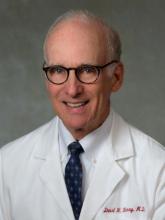Daniel G. Haller, MD, of the University of Pennsylvania, Philadelphia, joins Blood & Cancer host David H. Henry, MD, also of the University of Pennsylvania, to review the top research presented at ASCO GI 2019. Plus, in Clinical Correlation, Ilana Yurkiewicz, MD, of Stanford (Calif.) University shares the story of a patient who had no questions about the details of his treatment but needed answers about the “big picture.”
Show Notes
By Emily Bryer, DO, resident in the department of internal medicine, University of Pennsylvania, Philadelphia
Phase 2 trial of pembrolizumab (Keytruda), chemotherapy, and trastuzumab (Herceptin) in gastric cancer:
- Patients had previously untreated HER2 IHC+ or FISH+ tumors.
- Patients received pembrolizumab, trastuzumab/CAPOX (capecitabine and oxaliplatin) or FOLFOX (folinic acid, fluorouracil, and oxaliplatin).
- Patients all had a 100% response rate, prompting an ongoing phase 3 trial (KEYNOTE-811).
Third-line therapy for gastric cancer – TAGS, a phase 3 trial: supportive care vs. trifluridine plus tipiracil (Lonsurf):
- Gastrectomy did not affect outcome, safety, or pharmacokinetics.
- Neutropenia, a major toxicity, is manageable.
- Trifluridine and tipiracil are now a National Comprehensive Cancer Network Level 1 guideline for third-line therapy in patients with gastric cancer.
Neoadjuvant chemotherapy in pancreatic cancer:
- Compared neoadjuvant gemcitabine and S1 (NAC-GS) with upfront surgery for patients with pancreatic ductal adenocarcinoma and planned resection.
- Saw a significant survival benefit (37 months) of NAC-GS over upfront surgery (26 months).
Circulating tumor cells (CTC) in colorectal cancer:
- Studied patients with planned colonoscopies for colorectal screening.
- Took blood at the time of the procedure.
- Identified an absolute correlation with CTC and an increased disease burden in patients with colon cancer.
Additional reading:
Lancet Oncol. 2018 Nov;19(11):1437-48.
Oncotarget. 2018 May 11;9(36):24561-71.

